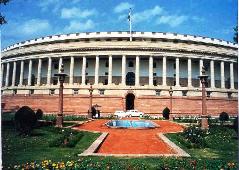 A meeting of an Empowered Group of Ministers on changing priority for gas allocation has been postponed.
A meeting of an Empowered Group of Ministers on changing priority for gas allocation has been postponed.
The EGoM headed by Defence Minister A K Antony was scheduled to meet on Tuesday to consider abolishing the priority ranking in natural gas allocation so that fuel currently consumed by urea plants can also be diverted to fuel-starved power plants.
"The EGoM is not happening tomorrow," a source with direct knowledge of the development said.
Another source said the meeting has been postponed as the Oil Ministry has parallelly approached the Cabinet Committee on Economic Affairs for raising natural gas prices.
Some like the Finance Ministry want a reconciliation between the two proposals.
The Oil Ministry in a proposal to EGoM sought abolishing the priority ranking according to which natural gas is first given to urea manufacturing fertiliser plants, then to LPG units, followed by power plants, city gas, steel and refineries, sources said.
This priority ranking meant when output from Reliance Industries' eastern offshore KG-D6 fields started falling in 2011, supplies to refineries was cut first and was followed by steel and city gas sectors.
From November 2011, supplies to 25 power plants, which had signed for 29.74 million standard cubic meters per day of KG-D6 gas, were pro-rata cut and this year completely stopped as KG-D6 plummeted to one-fourth of volumes touched in March 2010.
Sources said the current KG-D6 production of about 15 mmscmd is just sufficient to meet the full requirement of fertiliser sector and some of LPG plants,
To CCEA, the ministry had proposed raising current gas price of USD 4.2 per million British thermal unit to an average of international hub and LNG price.
Rate according to this formula comes to $6.775. The ministry has put forth two options before the EGoM -- equal priority to all core sectors of fertilisers, LPG, power and city gas distribution or giving fertiliser and power equal priority.
The gas supplies would be redistributed among the sector users ‘pro-rated based on the signed gas supply agreements’.
If available gas is to be redistributed among the four core sectors, it would reduce supplies to fertiliser plants by 9.44 mmscmd and lead to an extra urea import of 4.73 million tonnes, that would levy an additional subsidy burden of about Rs 5,591 crore (Rs 55.91 billion) per annum.
On the other hand, supply to power sector will increase by 10.07 mmscmd, resulting in additional production of about 16,000 million units of electricity per annum.
Sources said the ministry reasoned that the production cost of power projects forced to use re-gasified LNG would go down by Rs 10,900 crore (Rs 109 billion) per annum.
The ministry's second option giving equal priority to the power sector as is available to the fertiliser sector, would mean gas supply to urea plants would go down by 9.07 mmscmd forcing an import of 4.54 million tonnes of urea at an additional subsidy burden of Rs 5,372 crore (Rs 53.72 billion) per annum.
Gas to power would go up by 10.79 mmscmd leading to an extra output of about 17,000 million electricity units per annum, saving in production cost of Rs 11,700 crore (Rs 117 billion) per annum.











 © 2025
© 2025